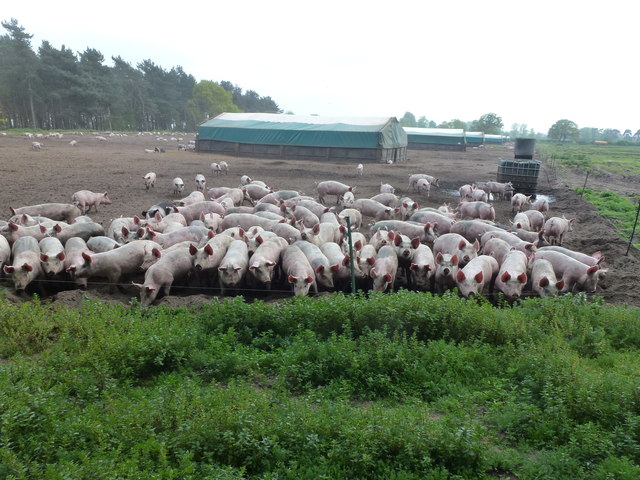 Pork – a favourite food of many Brits, whether it’s as a key ingredient of a roast dinner or a full English Breakfast! But, British pig farmers may be in for a tricky ride and we might be seeing foreign pork on our plates in the months to come. This is because of the falling price of pork, which may be driving local farmers out of the market.
Pork – a favourite food of many Brits, whether it’s as a key ingredient of a roast dinner or a full English Breakfast! But, British pig farmers may be in for a tricky ride and we might be seeing foreign pork on our plates in the months to come. This is because of the falling price of pork, which may be driving local farmers out of the market.
As we know, market prices are determined by the interaction of demand and supply and as market conditions change, this will affect the price at which pork sells at. This in turn will have an impact on the incomes of farmers and hence on farmers’ ability to survive in the market. According to forecasts from Defra, specialist pig farms are expected to see a fall in income by 46%, from £49,400 to £26,500 in 2016. A key driver of this, is the decline in the price of pork, which have fallen by an average of £10 per pig. This loss in income has led to pig farmers facing the largest declines of any type of farm, even beating the declines of dairy farmers, which have been well-documented.
If we think about the forces of demand and supply and how these have led to such declines in prices, we can turn to a few key things. Following the troubles in Russia and the Ukraine and Western sanctions being imposed on Russia, a retaliation of sorts was Russia banning European food imports. This therefore reduced demand for British pork. Adding to this decline in demand, there were further factors pushing down demand, following suggestions about the adverse impact that bacon and ham have on health. If pig farmers in the UK continue with the number of pigs they have and bearing in mind they would have invested in their pig farms before such bans and warnings were issued, then we see supply being maintained, demand falling and prices being pushed downwards.
Zoe Davies, Chief Executive of the National Pig Association said:
“This year is going to be horrendous for the British pig industry … Trading has been tough for at least 18 months now and we are starting to see people leave. We’re already seeing people calling in saying they’ve decided to give up. All we can hope is that more people leave European pig farms before ours do.”
We can also look to other factors that have been driving pig farmers out of business, including a strong pound, the glut of supply in Europe and productivity in the UK. Lily Hiscock, a commentator in this market said:
“It is estimated that the average pig producer is now in a loss-making position after 18 months of positive margins … The key factors behind the fall in markets are the exchange rate, UK productivity and retail demand … Indeed, pigmeat seems to be losing out to cheaper poultry meat in consumers’ shopping baskets … The recent fall in prices may stimulate additional demand, and a strengthening economy could help, but at present these are hopes rather than expectations.”
The future of British pig farms is hanging in the balance. If the economy grows, then demand may rise, offsetting the fall in demand being driven by other factors. We will also see how the exit of pig farmers affects prices, as each pig farmer drops out of the market, supply is being cut and prices rise. Though this is not good news for the farmers who go out of business, it may be an example of survival of the fittest. The following articles consider the market for pork.
Podcast
 UK pork market, Poppers, Scrap Metal BBC Radio 4, You and Yours (28/01/16)
UK pork market, Poppers, Scrap Metal BBC Radio 4, You and Yours (28/01/16)
Articles
Drop in global pork prices to bottom out – at 10-year lows agrimoney.com (29/01/16)
UK pork crisis looms as pig farmers expect income to half in 2016 Independent, Zlata Rodionova (5/02/16)
British pig farmers et for horrendous year as pork prices fall Western Morning News (17/01/16)
Questions
- What are they demand-side and supply-side factors which have pushed down the price of pork?
- Illustrate these effects using a demand and supply diagram.
- Into which market structure, would you place the pork industry?
- Using a diagram showing costs and revenues, explain why pig farmers in the UK are being forced out of the market.
- How has the strength of the pound affected pork prices in the UK?

